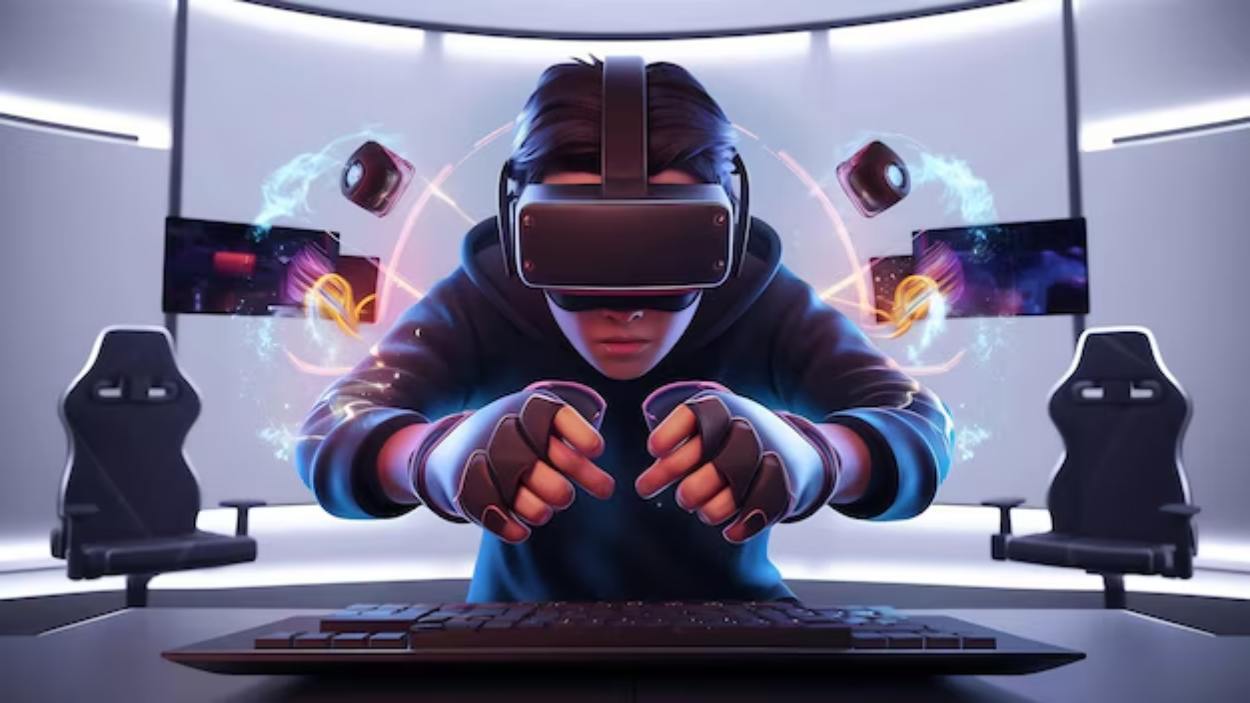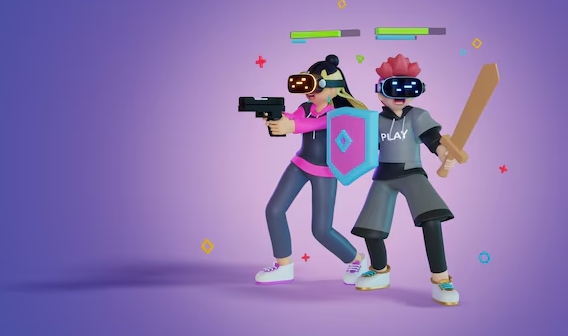DAO-Governed Gaming: What’s it all about?

Video games were never just entertainment, but rather experiments in technology, community, and imagination. From the first simple arcades to the present-day expansive online worlds, the gaming culture has been shaped by players as much as developers. However, the emergence of blockchain and Web3 marks a new chapter in this process: games aren’t just played by their communities, but are also managed by them.
The core of this change is DAOs, or Decentralized Autonomous Organizations. These online cooperatives enable members to vote on the rules, collect funds in pools to share, and even influence the game’s future. Power is decentralized, rather than centralized in studios, and the daily log-in people are those who are concerned with the worlds they inhabit.
Let’s discuss the concept of DAO-governed gaming: how it functions, why it is essential, and the challenges it faces. We will examine its development, how it works, its perspectives, and how AI is utilized, as well as the economic risks that every player and game creator must be aware of.
What Are DAOs and Why Does Gaming Care?
- The term DAO, or Decentralized Autonomous Organization, is a framework based on blockchain technology, in which decisions are made collaboratively by its members instead of being made by a single entity. Rules and processes are coded into smart contracts, self-executable snippets of code that can only be modified with community consensus as opposed to being determined by a single company or studio. This ensures DAOs have accountable, transparent, and decentralized control.
- This model suits gaming communities perfectly. Since time immemorial, players have formed guilds, clans, and forums, often with established rules and traditions to follow. A DAO brings the same ethos of community to blockchain-supported infrastructure, where votes, treasuries, and common resources can be verified and enforced.
Why does this matter? In games governed by DAOs, players no longer consume content; they co-create it. Gamers can be the ones who shape the universes they adore by voting on changes to the balance, as well as financing esports tournaments or new storyline arcs. It is a democracy in terms of play.
Player Power Evolution
- Throughout gaming history, studios have been in control. Developers wrote the rules, defined the content, and controlled the in-game economies. Players were not given the option to choose anything but to accept updates and patches as they became available. However, with time, communities began to counteract and find areas of influence.
- The emergence of mods in games such as Skyrim and Minecraft demonstrated that gamers were not only spectators, they were creators. Whole ecosystems were created around user-generated content, and this proved that collective innovation can sustain a game long after the official updates it received dropped to a crawl. Subsequently, live-service games like Fortnite and League of Legends draw attention to community power in their own manner by basing development decisions on player feedback and these giant online cultures.
- Web3 takes this trend and transforms community authority into a structural and not optional component. Voting rights and shared ownership are integral to the game through DAOs. The form of petitions and hope is currently being transformed into blockchain governance, with players having enduring and quantifiable power over the virtual worlds they inhabit.
Web3 Gaming: Autonomous Intelligence

- As DAOs provide players with a unified authority, Autonomous Intelligence delivers an additional twist to Web3. Artificial intelligence does not confine itself to non-playable characters (NPCs) reading off a piece of paper in DAO-controlled games. Instead, AI agents are capable of learning, evolving, and even engaging in governance procedures to assist communities in making informed decisions.
- Think of NPCs that update their strategies depending on the market conditions, or virtual economies that correct themselves without the need for a developer to intervene. These AI systems can serve as regulators, implementing rules in the community encoded in smart contracts, and even propose ideas to players that they can vote on. The agents are also used to autonomously work alongside the treasuries of a specific DAO, particularly in experimental projects, where a set amount of funds is devoted to an in-game or balanced reward event.
- This brings in not only exciting prospects but also significant questions. AI will be able to create virtual worlds that are more active and reactive, but excessive use may lead to the complete elimination of human decision-making. The problem with DAO-powered gaming is that it is challenging to strike a balance between the concepts of automation and community decision-making: the technology should not take away players’ power, but augment it.
DAO Mechanics in Gaming
- To operate games governed by a DAO, precise mechanics are needed to govern decision-making and resource management. The most widespread approach involves the use of governance tokens, which grant players the authority to vote on proposals. These tokens may be awarded as a result of gameplay accomplishments, purchases, or in response to community input. Other projects incorporate reputation-based voting, in which the role is assigned based on long-term engagement, rather than the number of tokens possessed.
- Another essential element is treasury management. The DAO of a game can have access to millions of dollars worth of pooled assets to decide whether to finance esports tournaments, indie developers, or make a new in-game story. These treasuries are typically secured using smart contracts, which ensure transparent accounting and prevent mismanagement.
- Rule enforcement is also implemented with the help of smart contracts. Distributing loot and resolving disputes are just a few examples of rules executed automatically, rather than waiting to be approved by the studio. Examples in the real world include Decentraland, where landowners conduct votes on platform changes, and Yield Guild Games, where members vote on how to utilize resources to optimize common rewards.
Dilemmas and Debates
- Gaming governed by DAOs remains in the experimental phase, and as such, it presents an acceptable amount of challenges. Governance fatigue is one of the largest: although it sounds empowering to vote on every change, many players do not want to waste several hours reading proposals. The focus of power is another issue. Within token-based systems, the results may be influenced by the wealthy whales, who can undermine the democratic spirit that DAOs are intended to embody.
- The other complexity is regulatory uncertainty. Governments have yet to determine the classification of DAOs, whether they should be classified as companies, cooperatives, or a hybrid of both. This gray space means that games operated by DAOs can be challenging to scale when money is flowing across borders. There is also an issue with technical literacy: most gamers are unfamiliar with crypto wallets, smart contracts, and on-chain voting, which makes it difficult for them to participate.
- Next, there is the problem of speculation. At the moment of crisis, the DAO worlds may begin to resemble crypto crash gambling. Governance tokens sold to players may appreciate, but instead, they could fall in tandem with the rest of the crypto market. To others, these rapid rises produce the same adrenaline that betting does, and they become more involved in risk-taking. The analogy of gambling is even more evident when treasuries suffer unexpected losses and communities must make emergency decisions.
- This speculative thinking may compromise governance in the long term because players are driven by short-term gains at the expense of long-term growth. Unless designed with particular care, DAO-managed games will become casinos masquerading as communities, where chance prevails over strategy and trust is eroded as the market shifts. It is to remind us that economic resiliency is no less than technical innovation.
Gamers and Developers: Economic Implications
- The transition to a DAO governance system alters the financial order between studios and players. Traditional models had developers selling copies, subscriptions, or cosmetic microtransactions. This is replaced by token economies and common treasuries, operated by DAO-driven ecosystems, in which revenues and costs are transparent to all.
- To players, this will have the effect of more involvement in the allocation of funds. Their vote can be to channel revenue into esports sponsorships, narrative expansions, or content created by players. Gamers are no longer just passive spenders, but they now enjoy a real stake in the utilization of resources.
- The change is also profoundly impactful for the developers. They are no longer the single point of power, but instead partners who must gain community consent for significant programs. Although this democratization has the benefit of developing loyalty, it also brings about uncertainty, as funding and decision-making are dependent on the community’s feelings, which can change easily. Instead, when appropriately implemented, DAO models have the power to establish more equitable profit-sharing models, compensating creators and players, and building more robust and sustainable gaming economies.
Future of DAO-Governed Gaming

- In the future, the transformation of digital worlds will be influenced by DAO-controlled gaming. Cross-chain interoperability is one of the new trends that enables players to transfer assets and governance rights between various games and platforms. This allows for an expanded ecosystem where a player can affect more than a title.
- One more boundary is identity. Since players will have a history of governance, their reputations may become transferable, gaining credibility not only in a single game but also across several DAOs. This layer of reputation could help alleviate issues such as governance fatigue or malicious voting, as communities would be able to favor voices that have a good track record.
- Even greater dynamism is suggested by the incorporation of AI. The integration of DAOs and autonomous intelligence has the potential to create persistent game worlds that respond to both community votes and AI-driven changes. The actual test, however, will be whether mainstream viewers accept this model. Games controlled by DAOs can be either a fringe activity among Web3 enthusiasts or a new equilibrium in the broader gaming industry, characterized by creativity, control, and community.
Conclusion
DAO-based gaming is no buzzword; it is an experiment of recreating digital ownership, creativity, and decision-making. DAOs enable communities to become co-builders of their favorite worlds by granting them power. There are opportunities and additional complexity added by the integration of blockchain transparency, smart contracts, and AI.
Things are not that easy: there is speculation, regulatory obstacles, and the danger of governance exhaustion. However, the possibility should not be disregarded. When properly implemented, games with a DAO can serve as a prime example of joint innovation, with all parties working on an equal level. Distributed autonomy within organizations may be one of the most radical transformations of gaming as it advances to push the limits of technology and culture, a collision of democracy, play, and digital economies.
